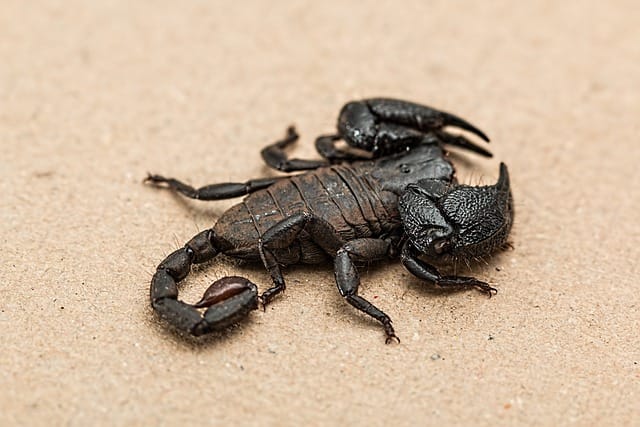The Asian Forest Scorpion (Heterometrus species) is one of nature’s most fascinating creatures. Known for its impressive size, powerful pincers, and nocturnal habits, this scorpion thrives in the dense tropical rainforests of Southeast Asia. In this article, we’ll explore the diet, hunting strategies, survival adaptations, threats, and ecological importance of this incredible arachnid.
Table of Contents
What Do Asian Forest Scorpions Eat in the Wild?
Asian Forest Scorpions are primarily insectivores, feeding on a variety of small creatures found in their natural habitat. Their diet includes:
- Insects: Crickets, cockroaches, beetles, and other small insects form the bulk of their diet.
- Occasional Prey: In certain environments, they may also feed on small vertebrates like frogs or lizards when available.
- Opportunistic Feeding: These scorpions are not picky eaters and will consume any small prey that comes within their reach.
Their nocturnal behavior allows them to hunt efficiently at night, when many insects are active, reducing competition for food.
How Asian Forest Scorpions Hunt for Their Prey
The hunting techniques of the Asian Forest Scorpion are a blend of stealth, strength, and precision.
- Pincers and Venom: They use their powerful pincers to grasp and crush prey, while their venom immobilizes or kills it quickly.
- Sensory Adaptations: Specialized sensory hairs on their pincers and legs detect vibrations, helping them locate prey even in total darkness.
- Ambush Tactics: Asian Forest Scorpions are ambush predators, lying in wait for unsuspecting prey to come close before striking with lightning speed.
These hunting skills ensure their survival in the competitive ecosystems of tropical rainforests.
Adaptations for Survival in Tropical Rainforests
Asian Forest Scorpions have evolved several adaptations to thrive in their environment:
- Camouflage: Their dark, shiny exoskeleton helps them blend into the forest floor, making it easier to avoid predators and surprise prey.
- Nocturnal Behavior: By being active at night, they avoid many daytime predators and reduce direct competition for resources.
- UV Fluorescence: Under UV light, their exoskeleton glows, although the purpose of this trait remains a mystery. Some researchers speculate it may play a role in communication or protection against harmful sunlight.
These adaptations make them formidable survivors in the dense, competitive jungles of Southeast Asia.
Threats to Asian Forest Scorpions in the Wild
Despite their resilience, Asian Forest Scorpions face several threats that challenge their survival:
- Predators: Larger animals like snakes, birds, and mammals often prey on scorpions.
- Habitat Loss: Deforestation and human encroachment on tropical rainforests have significantly reduced their natural habitats.
- Exotic Pet Trade: The growing demand for scorpions as exotic pets has led to increased collection from the wild, putting additional pressure on their populations.
Conservation efforts are crucial to ensure these incredible creatures remain a part of our natural world.
The Role of Asian Forest Scorpions in the Ecosystem
Asian Forest Scorpions play an important role in maintaining ecological balance:
- Controlling Insect Populations: As predators, they help regulate populations of insects, preventing overpopulation.
- Prey for Larger Species: They serve as a food source for larger predators, contributing to the food chain.
- Ecosystem Balance: By feeding on various small creatures, they help maintain biodiversity and ecological stability in their habitats.
Their presence is vital for the health of the ecosystems they inhabit.
Conclusion
The Asian Forest Scorpion is a marvel of the natural world, equipped with incredible hunting abilities and survival strategies. Despite their intimidating appearance, these scorpions are an essential part of the rainforest ecosystem. However, habitat destruction and human interference pose significant threats to their existence. By understanding and appreciating these fascinating creatures, we can contribute to their conservation and ensure they continue to thrive in the wild.
Have you encountered an Asian Forest Scorpion or other exotic creatures? Share your thoughts and experiences in the comments below!
Explore More: Curious about other exotic creatures or pet care tips? Check out our latest articles on Exotic Pet Haven for more fascinating insights!


1 thought on “Asian Forest Scorpion Diet and Survival in the Wild”
Comments are closed.